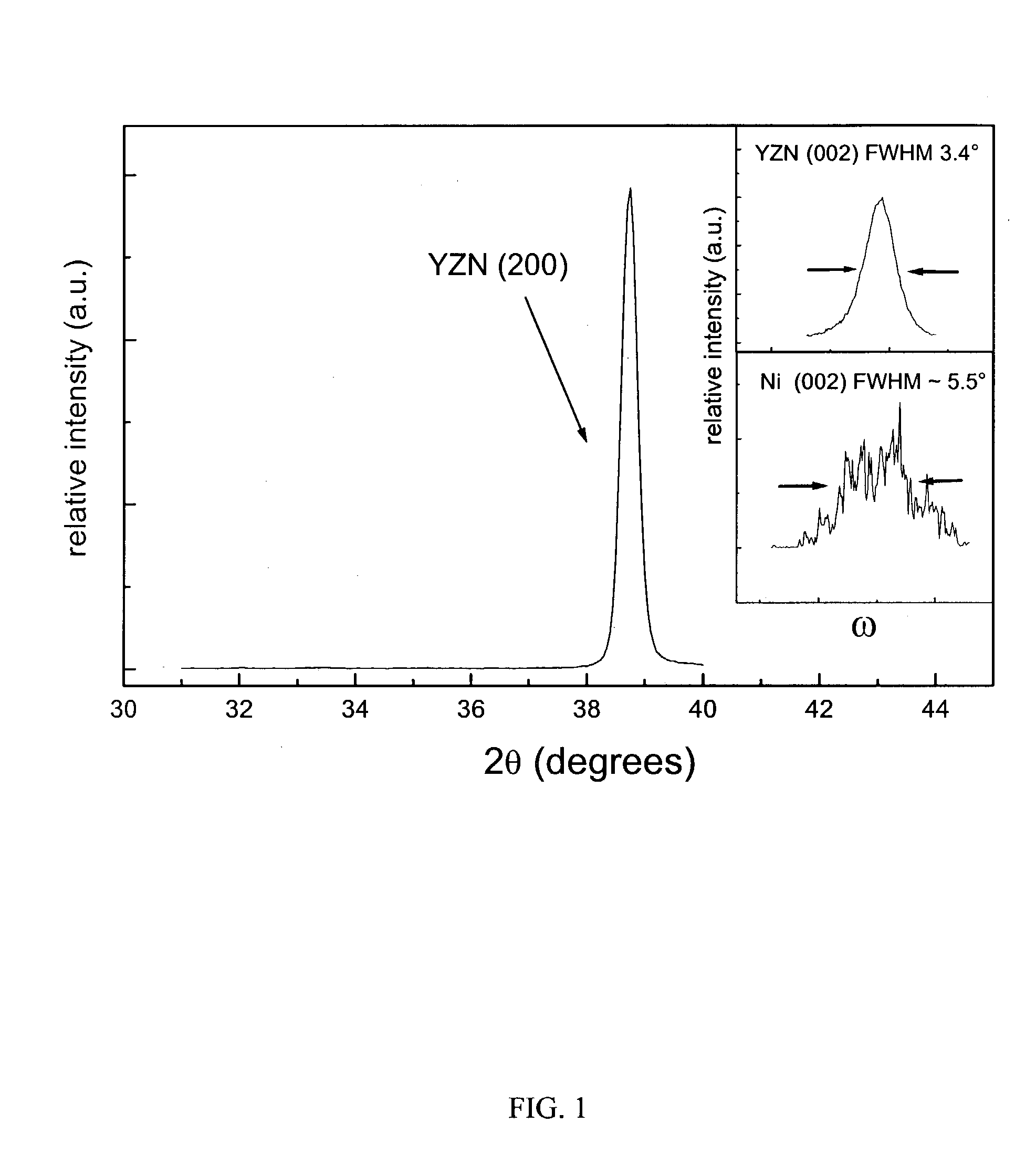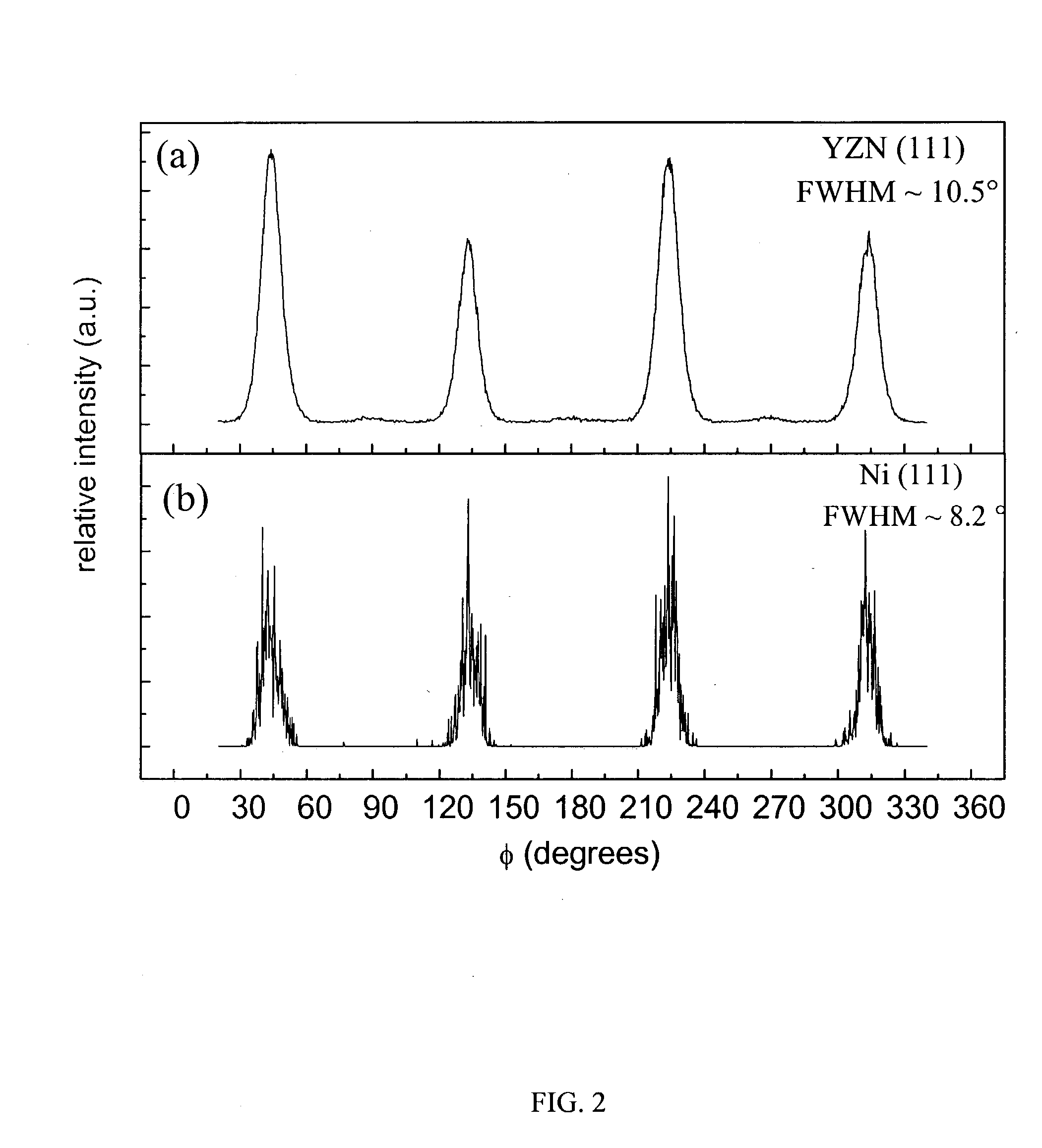Epitaxial oxide films via nitride conversion
a technology of nitride and oxide films, applied in the field of epitaxial oxide films via nitride conversion, to achieve the effects of easy epitaxial ybco process, good biaxial texture, and small lattice mismatch
- Summary
- Abstract
- Description
- Claims
- Application Information
AI Technical Summary
Benefits of technology
Problems solved by technology
Method used
Image
Examples
example 1
[0085] Magnetron sputtered (Zr.sub.0.8Y.sub.0.2)N (YZN) films were grown on biaxially textured Ni substrate, using a two temperature technique. Initially growth was done at 500.degree. C. until the YZN thickness reached .about.30 nm. Then the growth temperature was raised to 700.degree. C. and remained the same for rest of the deposition. Total film thickness was .about.200 nm and a deposition rate of 0.12 nm / sec. The films showed good in-plane and out-of-plane alignment. FIG. 1 shows a XRD .theta.-2.theta. scan, and FIG. 2 shows the (111) pole figure. The existence of only four peaks demonstrates a single epitaxial orientation. The location of the peaks in the (111) pole figure is consistent with a cube-on-cube epitaxial relationship. The YZN (111) phi scan showed a full-width-half-maximum (FWHM) obtained by fitting a Gaussian curve to the data to be 10.5.degree.. The FWHM is only slightly better than that of the underlying Ni with a FWHM of .about.8.2.degree.. The rocking curves F...
example 2
[0086] Magnetron sputtered (Zr.sub.0.8Y.sub.0.2)N (YZN) films were grown at a substrate temperature of .about.550.degree. C. on biaxially textured nickel substrates at a deposition rate of 0.12 nm / sec. The films had a thickness of 50 nm. The films showed in-plane and out-of-plane alignment. FIG. 3 shows a XRD .theta.-2.theta. scan, shows intense (200) peak. The presence of a (111) peak indicates that this sample has substantial out of plane texture in (200) direction but is not epitaxial. FIG. 4 shows the (111) phi-scan from same sample. The location of the peaks in the (111) phi peaks is consistent with a cube-on-cube epitaxial relationship. The YZN (111) phi scan showed a full-width-half-maximum (FWHM) obtained by fitting a Gaussian curve to the data to be 10.9.degree., indicating the grains that aligned to (200) orientation in out-of-plane direction also has some in-plane textures. The rocking curve FWHM (the out-of-plane texture) of the YZN layer was found to be 5.8.degree. in r...
example 3
[0087] Y.sub.0.5Z.sub.0.5N films have been grown on single crystal MgO using reactive magnetron sputtering in order to study the solid solution range in the YN--ZrN system. Growth was carried out in Ar--N.sub.2 mixtures. Typical growth temperatures ranged from 400.degree. C. to 800.degree. C. and typical growth rates were .about.0.2 nm / sec. For deposition of Y.sub.0.5Z.sub.0.5N 99.95% pure Y and Zr targets were used. FIG. 5 shows .theta.-2.theta. x-ray diffraction (XRD) scan of a nominal Y.sub.0.5Z.sub.0.5N film grown on MgO. The thickness of film was 500 nm. The pattern clearly shows presence of both YN and ZrN phases suggesting a phase miscibility gap existing in the YN-ZrN pseudo-binary system.
PUM
| Property | Measurement | Unit |
|---|---|---|
| partial pressures | aaaaa | aaaaa |
| thick | aaaaa | aaaaa |
| radii | aaaaa | aaaaa |
Abstract
Description
Claims
Application Information
 Login to View More
Login to View More - R&D
- Intellectual Property
- Life Sciences
- Materials
- Tech Scout
- Unparalleled Data Quality
- Higher Quality Content
- 60% Fewer Hallucinations
Browse by: Latest US Patents, China's latest patents, Technical Efficacy Thesaurus, Application Domain, Technology Topic, Popular Technical Reports.
© 2025 PatSnap. All rights reserved.Legal|Privacy policy|Modern Slavery Act Transparency Statement|Sitemap|About US| Contact US: help@patsnap.com



